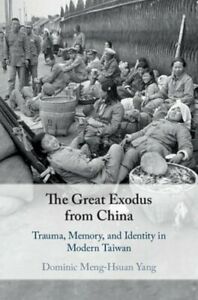MSA First Book Award 2021 Winner Announced
The Memory Studies Association is pleased to announce the winner of the MSA First Book Award, which is co-sponsored by the SAGE journal Memory Studies. The award, which honours the best first monograph in the field of memory studies by an MSA member published in English in 2019 or 2020, goes to Dominic Meng-Hsuan Yang’s The Great Exodus from China: Trauma, Memory, and Identity in Modern Taiwan (Cambridge University Press).
The jury—made up of Sarah Gensburger, Catherine Gilbert, Klaus Neumann, and Jay Winter and chaired by Stef Craps—had the following to say about the winning entry:
Dominic Meng-Hsuan Yang’s The Great Exodus from China: Trauma, Memory, and Identity in Modern Taiwan is a highly accomplished and extensively researched study of the history, memories, and identities of waishengren, the mainland Chinese who fled or were evacuated to Taiwan in the late 1940s and early 1950s and their descendants. Drawing on personal testimonies and documentary sources, and engaging a broad range of memory studies scholarship, the author thoughtfully and skilfully explores how these people, who once arrived as invaders and refugees, came to regard Taiwan as their home. Along the way, he provides novel perspectives on categories such as diaspora and trauma, and introduces the generative concept of “multidirectional empathic unsettlements.” Carefully constructed and written with narrative flair, The Great Exodus from China is an important and compelling read, both as an account of Taiwanese postwar history and memory politics and as an understated story of the author’s own intellectual and emotional journey.
The award will be presented at the online MSA annual conference in Warsaw (5-9 July 2021), which will feature a plenary panel about The Great Exodus from China.
The jury would also like to recognise Anna Veprinska’s Empathy in Contemporary Poetry after Crisis (Palgrave Macmillan) with an honourable mention.
Until July 2021, if you are an MSA member, you can also enjoy a discount on (most) the books shortlisted for the MSA First Book Award. Find out more here.
MSA First Book Award 2021 Shortlist Announced
The Memory Studies Association is delighted to reveal the shortlist for the MSA First Book Award, which will be given to the best first monograph in the field of memory studies by an MSA member published in English in 2019 or 2020.
Listed in alphabetical order by the authors’ names, the six titles chosen by the jury—made up of Sarah Gensburger, Catherine Gilbert, Klaus Neumann, and Jay Winter and chaired by Stef Craps—are the following:
- Lea David, The Past Can’t Heal Us: The Dangers of Mandating Memory in the Name of Human Rights (Cambridge University Press)
- Julie Beth Napolin, The Fact of Resonance: Modernist Acoustics and Narrative Form (Fordham University Press)
- Sabina Tanović, Designing Memory: The Architecture of Commemoration in Europe, 1914 to the Present (Cambridge University Press)
- Anna Veprinska, Empathy in Contemporary Poetry after Crisis (Palgrave Macmillan)
- Peter J. Verovšek, Memory and the Future of Europe: Rupture and Integration in the Wake of Total War (Manchester University Press)
- Dominic Meng-Hsuan Yang, The Great Exodus from China: Trauma, Memory, and Identity in Modern Taiwan (Cambridge University Press)
The winner will be announced in April 2021, and the award will be presented at the MSA annual conference in Warsaw in July 2021.
Call for Nominations for MSA First Book Award 2021
The Memory Studies Association (MSA) invites nominations for the best first book published by an MSA member within the field of memory studies in 2019 and 2020.
Recognizing that memory studies is an interdisciplinary field, we welcome nominations of books published within any of our numerous sub-disciplines and related fields, be it cultural memory, collective memory, social memory, memory politics, trauma studies, memory and transitional justice, memory and witnessing, memory and oral history, memory and critical heritage studies, etc.
Any member of the MSA can nominate a book for the MSA First Book Award. The only requirements are that the author must be a member in good standing, the book must be the author’s first monograph, it must have been published in English in 2019 or 2020, and it must be of relevance to memory studies. The award winner will be selected by a jury appointed by the MSA leadership.
The winner of the MSA First Book Award, which is generously co-sponsored by the SAGE journal Memory Studies, will receive a formal certificate and a book pack valued at £200. Moreover, they will be honoured with a plenary panel about their book at the MSA conference in Warsaw (5-9 July 2021), for which they will also receive a travel grant.
If you wish to nominate a book, please send four copies, one to each member of the jury, no later than 10 December 2020:
Sarah Gensburger
23 Bd Voltaire
75011 Paris
France
Catherine Gilbert
School of Modern Languages
Old Library Building
Newcastle University
Newcastle upon Tyne
NE1 7RU
UK
Klaus Neumann
c/o Hamburger Stiftung zur Förderung von Wissenschaft und Kultur
Feldbrunnenstrasse 52
20148 Hamburg
Germany
Jay Winter
66 rue Rene Boulanger
75010 Paris
France
Hard copies are preferred, but you can also send photocopies. Please send a PDF version as well to firstbookaward@memorystudiesassociation.org.
For further information, please contact Stef Craps (stef.craps@ugent.be).
Previous Awards
The SAGE Memory Studies Journal and MSA Outstanding First Book Annual Award
Many thanks to all participants for submitting your excellent books for consideration for the SAGE Memory Studies and the MSA outstanding first book award. The nomination committee has worked its way through quite an abundance of innovative, impressive and thought-provoking new monographs. The choice really was a difficult one.
The committee unanimously chose Catherine Gilbert’s From Surviving to Living: Voice, Trauma and Witness in Rwandan Women’s Writing (Presses universitaires de la Méditerranée, 2018) as the winner of this year’s award. In this compelling work, Catherine combines the study of literature as testimony with skilful and sensitive use of existing theory, moving the dialogue between trauma and memory studies forward in new and compelling ways. The book is beautifully written and well structured. One of the book’s most innovative contributions lies in its use of Rwandan women’s testimony to challenge established Western uses of trauma theory to deal with the memory of atrocity. It engages long-standing and difficult questions about who has the right to speak, write, and be heard regarding traumatic historical events, while rethinking the jagged borders of witnessing between writer, reader, and addressee. The book is especially noteworthy for its attention to the possibilities and limits of collaboration between Rwandan women seeking to have their voices heard and their “enabling” collaborators in the West. Ultimately it presents the reader with new ways of thinking about the structures of national mourning and reconciliation, silence and voice, and the agency of testimony. This book also provides an important set of voices that are sometimes at risk for being silenced.
Honourable mentions
Two other books stood out in particular, and the award committee would further like to recognize Amy Sodaro’s Exhibiting Atrocity. Memorial Museums and the Politics of Past Violence (Rutgers University Press, 2018) and Yifat Gutman’s Memory Activism: Reimagining the Past for the Future in Israel-Palestine (Vanderbilt University Press, 2017) with an honourable mention for their outstanding scholarship and excellent presentation.
The nomination committee
Jonathan Bach, Steven Brown, Siobhan Kattago, Ihab Saloul and Tea Sindbæk Andersen




